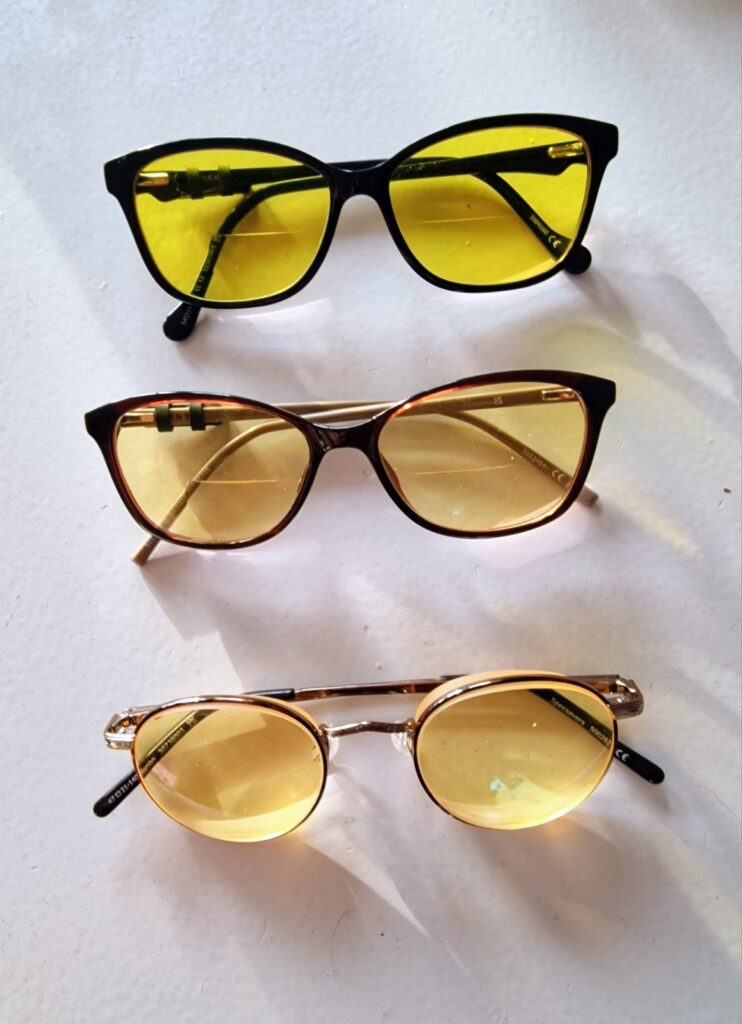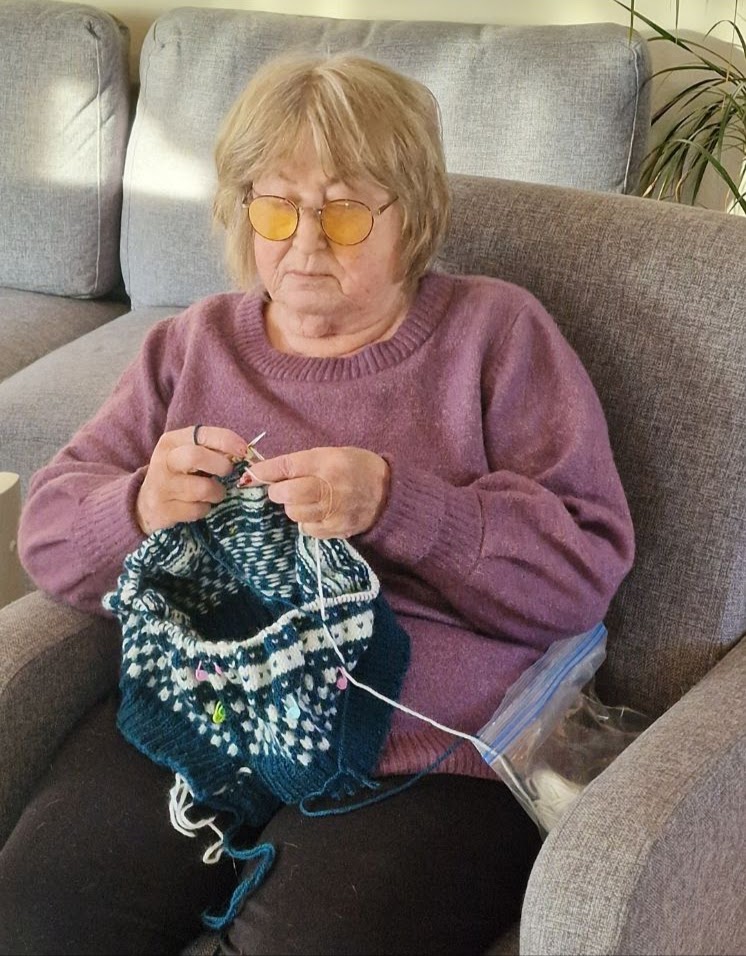What are filter glasses and how do you get them?

Astrid Helene Furulund is glad she wears filter glasses when it's snowing and the sun is low
"Now it's good to have filter glasses". These are the words of Astrid Helene Furulund. She is an active lady with a combined visual and hearing impairment. Astrid has been wearing filter glasses for the past five years. She thinks more people should have access to them. For Astrid, filter glasses mean she doesn't have to deal with the glare caused by snow, for example. Her filter glasses reduce the amount of light and remove the light that causes her problems. She also finds that her contrast vision is better. For Astrid, this means that she can do activities that would otherwise be impossible. But what are filter glasses and how do you go about getting them?
What are filter glasses and who benefits from them?
Sigrid Midtbø Storkås is an optician at Eikholt. She is well aware of the effect filter glasses can have and how important this aid can be for some people.

- "All coloured lenses will be a filter and will reduce the amount of light reaching the eye," says optician Sigrid. "When we talk about filter glasses, we often mean the lenses that reduce parts of the light, the part of the light that causes problems. For example, many people will experience less glare and better contrast if some or all of the blue light is filtered out. These glasses will look yellow or yellow-orange in colour.
Sigrid goes on to say that glare can be visually impairing, i.e. it makes it more difficult to use your remaining vision during activity. Glare can also be associated with pain or severe discomfort. Different eye conditions can cause challenges with adaptation, i.e. the eye's ability to adjust between different lighting conditions. A good pair of sunglasses or a more customised pair of filter glasses can help the person to make faster use of their residual vision.
- For people with reduced contrast vision, filter glasses can help them to get more information from their surroundings, for example making it easier to see steps or kerbs. "Many of the people I meet here at Eikholt tell me that they feel it in their whole body when they use a filter that has an effect, they experience that they use less energy," says Sigrid.

Filter glasses can have power correction. You can get them as separate glasses or as a "fitover", i.e. the filter glasses are worn over your normal glasses. Filter glasses can also be made as a clip-on - that is, the filter glasses are worn on top of normal glasses. The type of filter glasses that each person can benefit from is individual, and unfortunately there is too little research in this field. There is no quick and effective method for finding out which type of filter lens suits the individual and whether filter lenses have a positive effect (Lund & Johansson, 2017).
How to find the right filter glasses?
- At Eikholt, we carry out individual assessments and trials of filter glasses. Testing of filters is usually done over several days and in different activities. Feedback from course participants is that time is of the essence. The aim is to test filters in activities and surroundings that are as similar as possible to each individual's everyday life. Typically, we go to a local shopping centre, where the amount of light and light quality often varies greatly between the different stores. We also test stairs and the use of guide lines. When testing filters outdoors, it's useful to assess the surroundings and the surface. If the problem is greatest when it's snowing, it's important that the testing takes place at that time of year," says optician Sigrid Storkås.
Who benefits from filter glasses?
For people with combined visual and hearing impairment, filter glasses help to optimise activities both indoors and outdoors. Of extra importance is the fact that filter glasses can help reduce the energy you use in everyday life. For example, when paying bills in online banking, filter glasses adapted for use in front of the computer screen can make this activity easier to perform.
How filter glasses helped Astrid
Astrid Helen Furulund has a combined visual and hearing impairment. In 2020, she was diagnosed with age-related macular degeneration, also known as AMD, which means that her visual acuity is reduced. (Health Library/BMJ, 2023). Her daughter then advised her to get filter glasses. However, Astrid realised that not all professionals are familiar with filter glasses, but she eventually got good help from an optician who adapted two pairs of filter glasses for different uses.
Astrid wears filter glasses both indoors and outdoors. The filter glasses make her feel safer because she can see contrasts, and she gets less tired because the filter glasses take away the unpleasant light. Astrid Helene says that she can simply see more. "With filter glasses, I can see the edges of the snow along the road, and that's not without significance," says Astrid.
Filter glasses make me safer and less tired
Quote Astrid Helene Furulund
Astrid has always loved needlework. Among other things, she wanted to knit herself a jacket, but without filter glasses it was impossible to tell the difference between knit and purl, or to pick up stitches if she dropped any. With the right filter glasses and good lighting in place, she has been able to resume this activity. It gives her a lot of joy.

How to get filter glasses
The National Insurance Scheme can subsidise filter glasses for people with severely impaired contrast vision, impaired adaptability or an abnormally high degree of light sensitivity (NAV.no).
In the NAV knowledge bank you'll find useful information about filter glasses and who to contact if you need visual aid.
Astrid's best tip is to get in touch with the vision and hearing contact in your municipality. This is often an occupational therapist or physiotherapist. They can help you along the way to check whether you can get filter glasses covered by the National Insurance Scheme.
Sources
Helsebiblioteket/BMJ. age-related macular degeneration (AMD). Oslo: Norwegian Directorate of Health; updated Wednesday 25 October 2023 (retrieved Monday 31 January 2025). Available from:https://www.helsenorge.no/sykdom/oyesykdommer/makuladegenerasjon/
Lund and Johansson (2017) Time for vision. Innovation with new technology to optimise vision for people with impaired vision and hearing. Project report-Time-for-sight-2017-final-report.pdf
Nav.no (retrieved 2025, 31 January) Glasses and contact lenses for the visually impaired, Available from Glasses and contact lenses for the visually impaired - nav.no
NAV.no, Filter glasses, Filter glasses | Knowledge bank, updated 25 October 2024 (retrieved Friday 31 January 2025) Available from https://www.kunnskapsbanken.net/syn/filterbrille/
Do you have any questions?
If you have any questions about filter glasses, please contact us. You can find contact information here: Contact us - Eikholt
